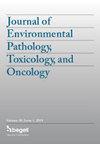PFKFB3 regulated the growth and migration of ovarian cancer cells
IF 2.9
4区 医学
Q3 TOXICOLOGY
Journal of Environmental Pathology Toxicology and Oncology
Pub Date : 2024-04-01
DOI:10.1615/jenvironpatholtoxicoloncol.2024052948
引用次数: 0
Abstract
Ovarian cancer is one of the most common malignant tumors in female reproductive organs. Its incidence rate is second only to uterine body cancer and cervical cancer, posing a serious threat to women's health. Herein, we explored that PFKFB3 in cancer progression of Ovarian cancer and its underlying mechanism. All the serum samples from Ovarian cancer were collected by our hospital. PFKFB3 mRNA expressions in patients with Ovarian cancer and Ovarian cancer cell lines were up-regulated. PFKFB3 protein expressions in Ovarian cancer cells were induced. Ovarian cancer patients with high PFKFB3 expression had lower survival rate. PFKFB3 gene promoted cell proliferation and EDU cells, and increased cell metastasis of Ovarian cancer. Si-PFKFB3 reduced cell proliferation and EDU cells, and decreased cell metastasis of Ovarian cancer. PFKFB3 gene up-regulation reduced caspase-3/9 activity levels of Ovarian cancer. Si-PFKFB3 also promoted caspase-3/9 activity levels of Ovarian cancer. PFKFB3 gene promoted Warburg effect progression of Ovarian cancer. PFKFB3 gene reduced NLRP3-induced pyroptosis of Ovarian cancer. PFKFB3 suppressed NLRP3 expression. NLRP3 was one target spot for PFKFB3 on pyroptosis of Ovarian cancer. Taken together, we conclude that PFKFB3 suppressed NLRP3 axis to reduce pyroptosis and increase Warburg effect progression of Ovarian cancer, and provide molecular insight into the mechanisms by which the PFKFB3 regulates pyroptosis of Ovarian cancer.PFKFB3 调控卵巢癌细胞的生长和迁移
卵巢癌是女性生殖器官中最常见的恶性肿瘤之一。其发病率仅次于子宫体癌和宫颈癌,严重威胁女性健康。在此,我们探讨了 PFKFB3 在卵巢癌癌症进展中的作用及其内在机制。卵巢癌患者和卵巢癌细胞株中 PFKFB3 mRNA 表达上调。卵巢癌细胞中 PFKFB3 蛋白表达被诱导。PFKFB3 高表达的卵巢癌患者生存率较低。PFKFB3 基因促进卵巢癌细胞增殖和 EDU 细胞,并增加细胞转移。Si-PFKFB3可减少卵巢癌的细胞增殖和EDU细胞,并减少细胞转移。PFKFB3 基因上调可降低卵巢癌的 caspase-3/9 活性水平。Si-PFKFB3 还能促进卵巢癌的 caspase-3/9 活性水平。PFKFB3 基因促进了卵巢癌的沃伯格效应进展。PFKFB3 基因降低了 NLRP3 诱导的卵巢癌热蛋白沉积。PFKFB3 基因抑制了 NLRP3 的表达。综上所述,我们得出结论:PFKFB3抑制NLRP3轴以减少卵巢癌的化脓过程并增加沃伯格效应的进展,为PFKFB3调控卵巢癌化脓过程的机制提供了分子见解。
本文章由计算机程序翻译,如有差异,请以英文原文为准。
求助全文
约1分钟内获得全文
求助全文
来源期刊
CiteScore
3.80
自引率
0.00%
发文量
20
审稿时长
>12 weeks
期刊介绍:
The Journal of Environmental Pathology, Toxicology and Oncology publishes original research and reviews of factors and conditions that affect human and animal carcinogensis. Scientists in various fields of biological research, such as toxicologists, chemists, immunologists, pharmacologists, oncologists, pneumologists, and industrial technologists, will find this journal useful in their research on the interface between the environment, humans, and animals.

 求助内容:
求助内容: 应助结果提醒方式:
应助结果提醒方式:


